外研版高中英语必修四 Module 1 Life in the future Grammar and Function 课件(共46张PPT)
文档属性
| 名称 | 外研版高中英语必修四 Module 1 Life in the future Grammar and Function 课件(共46张PPT) |

|
|
| 格式 | zip | ||
| 文件大小 | 1.1MB | ||
| 资源类型 | 教案 | ||
| 版本资源 | 外研版 | ||
| 科目 | 英语 | ||
| 更新时间 | 2019-05-07 08:38:12 | ||
图片预览


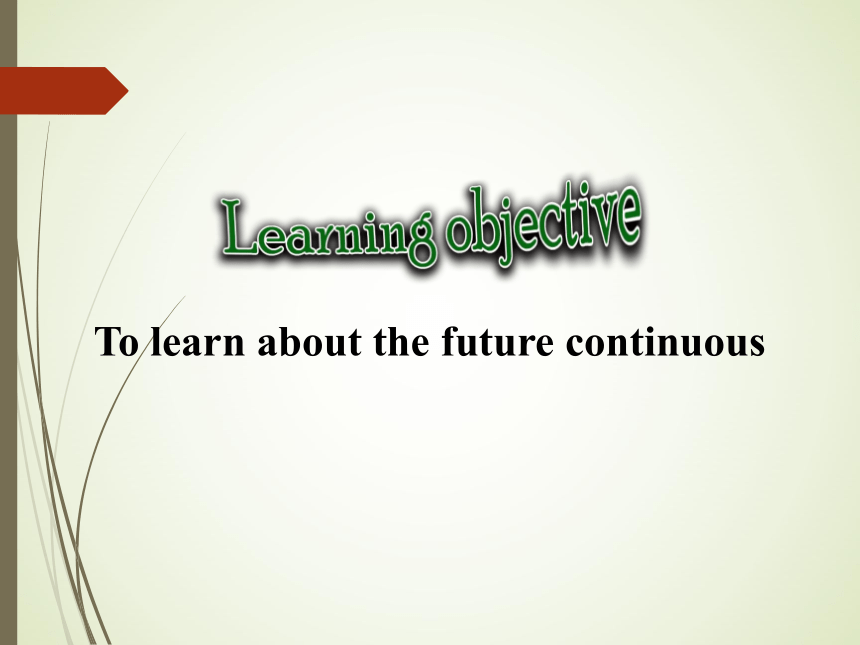
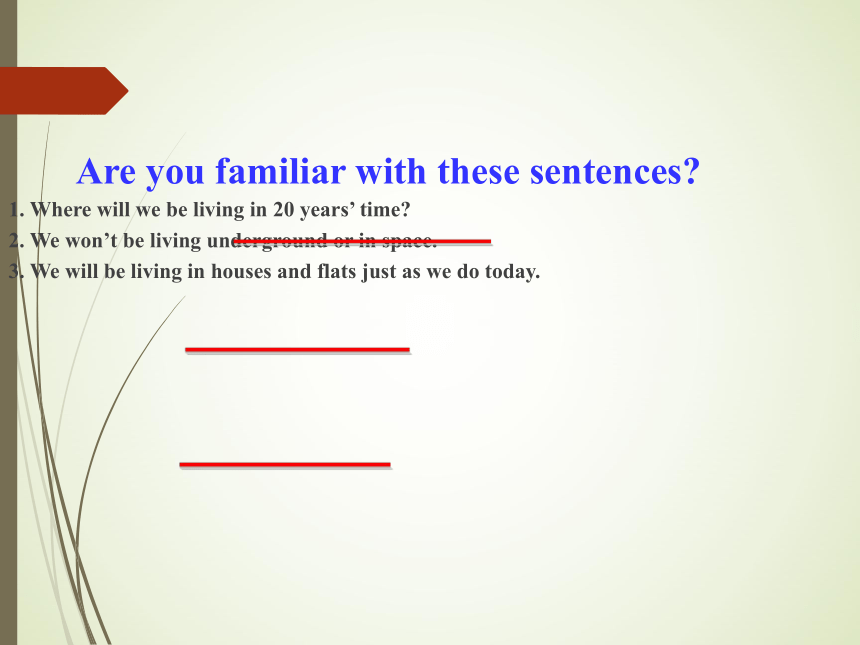
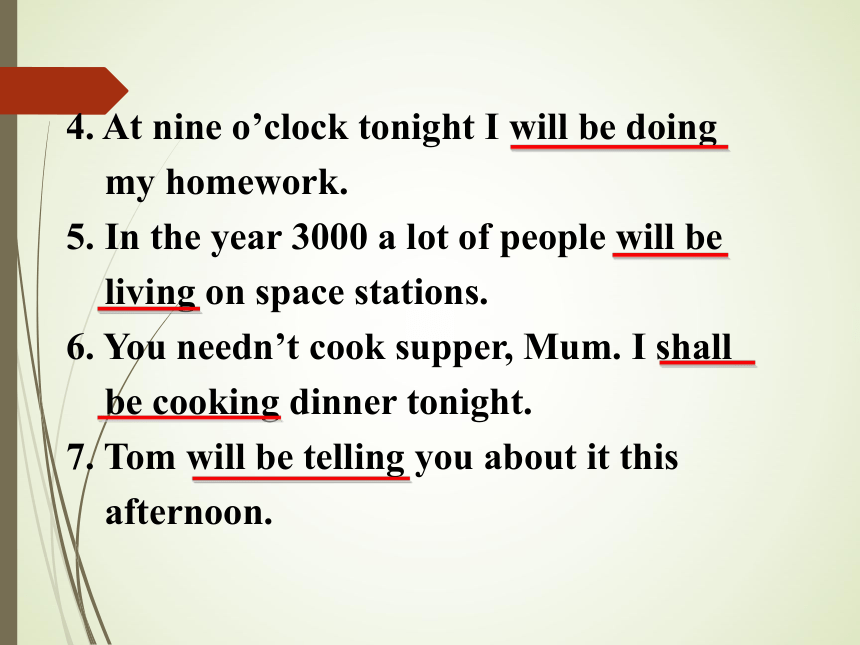
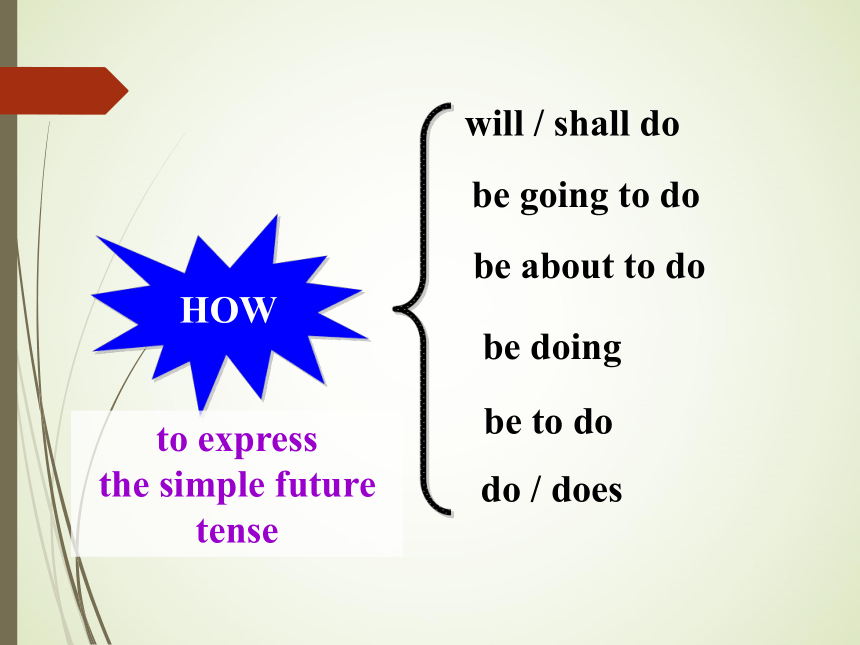
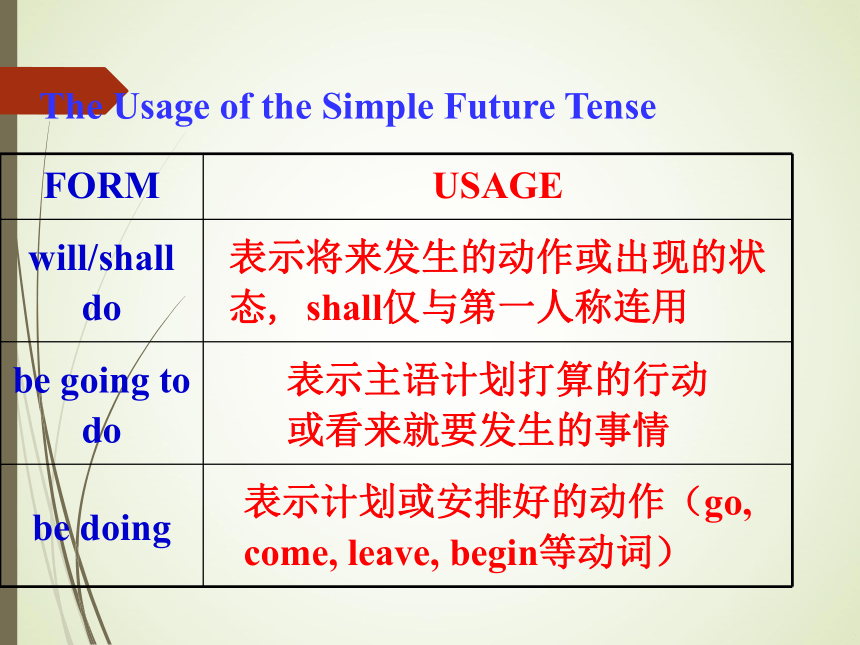
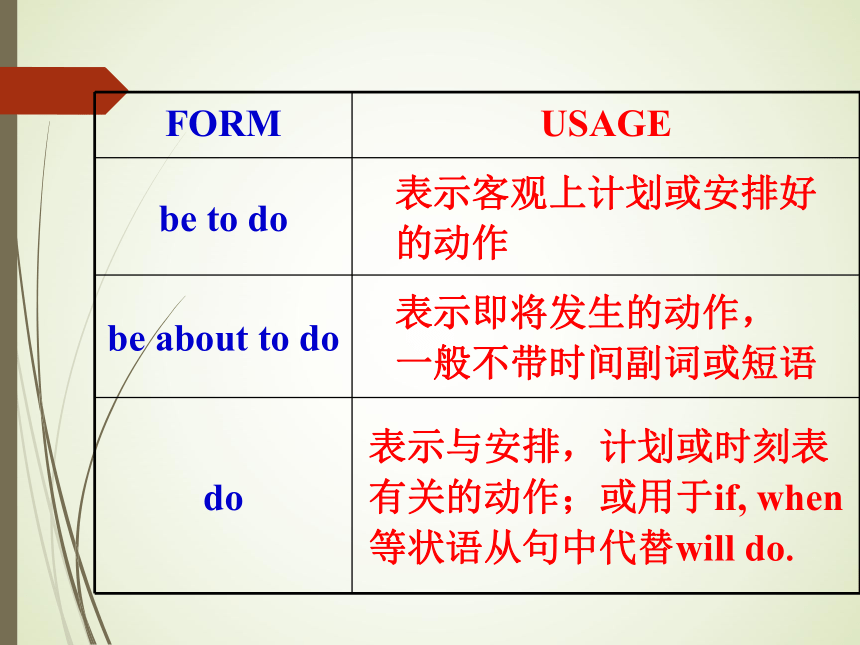
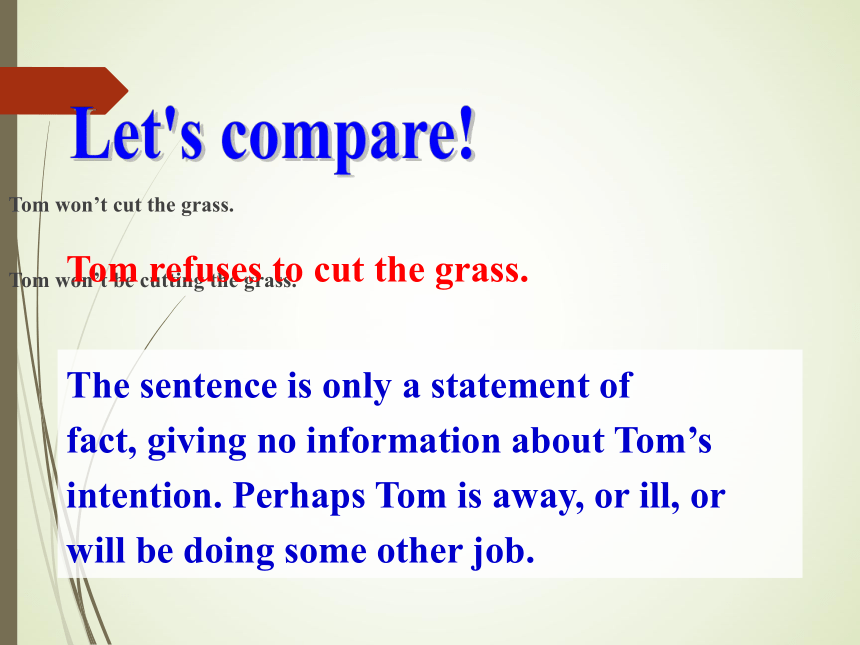
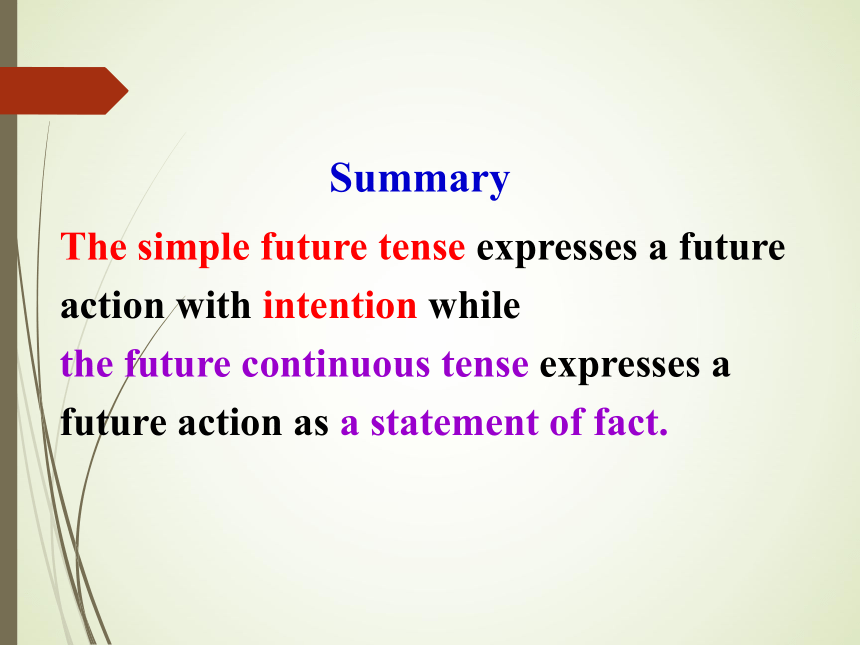
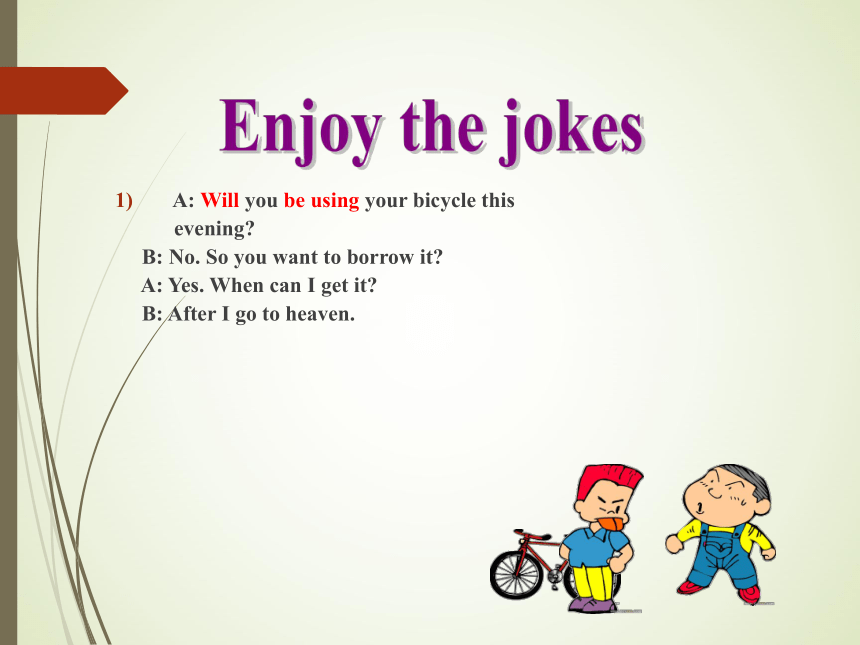
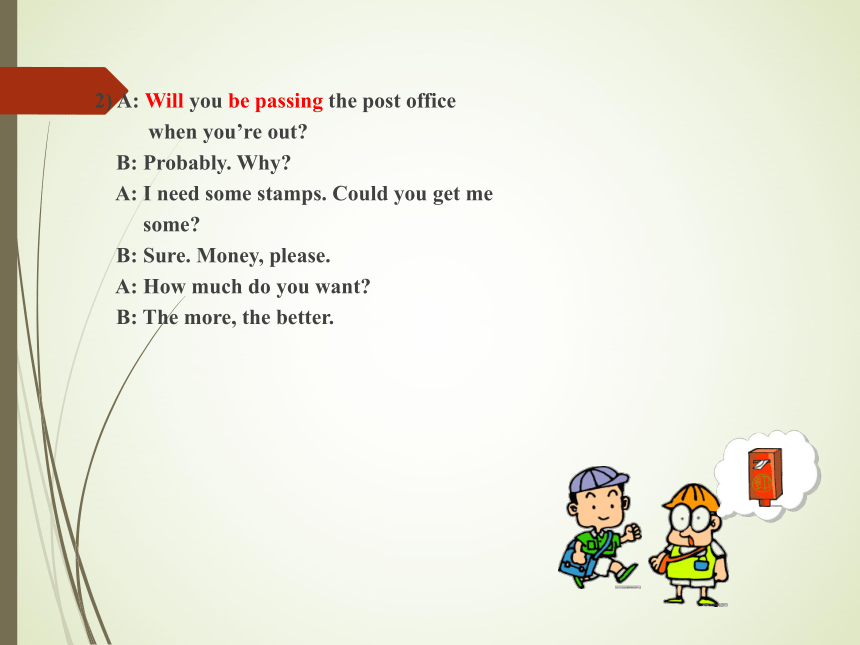
文档简介
课件46张PPT。Module 1
Life in the FutureThe future continuous To learn about the future continuous 1. Where will we be living in 20 years’ time?
2. We won’t be living underground or in space.
3. We will be living in houses and flats just as we do today.Are you familiar with these sentences?4. At nine o’clock tonight I will be doing
my homework.
5. In the year 3000 a lot of people will be
living on space stations.
6. You needn’t cook supper, Mum. I shall
be cooking dinner tonight.
7. Tom will be telling you about it this
afternoon. will / shall dobe going to dobe about to dodo / doesbe doingbe to doHOWto express
the simple future tenseThe Usage of the Simple Future TenseTom won’t cut the grass.
Tom won’t be cutting the grass.Let's compare!Tom refuses to cut the grass.The sentence is only a statement of
fact, giving no information about Tom’s
intention. Perhaps Tom is away, or ill, or will be doing some other job.Summary The simple future tense expresses a future action with intention while
the future continuous tense expresses a future action as a statement of fact. A: Will you be using your bicycle this
evening?
B: No. So you want to borrow it?
A: Yes. When can I get it?
B: After I go to heaven.Enjoy the jokes2) A: Will you be passing the post office
when you’re out?
B: Probably. Why?
A: I need some stamps. Could you get me
some?
B: Sure. Money, please.
A: How much do you want?
B: The more, the better.The future continuous (将来进行时)
将来进行时由“助动词shall/ will +be+现在分词”构成。shall用于第一人称单、复数; will用于各种人称。e.g. Our work will end in March. We will/shall be returning to New York.将来进行时的用法
1. 表示将来某一时刻或某一段时间里正在进行的动作。
e.g. We will be seeing a fashion show
this time tomorrow afternoon.2. 用于代替一般将来时(多用于口语中),使语言生动形象。用法如下:
1) 预料将要发生的动作或情况。
e.g. The train will be arriving soon.2) 表示现已决定或安排将要做的事。
e.g. Doctor Smith will be giving
another talk on family health
at the same time next week.3. 表示预料不久要发生或势必要发生的
事情或将来的某种可能性,说话人往
往有“我料想”或“我估计”的含义。如:
We believe that peasants’ life will be
getting better and better.
我们相信农民的生活会越来越好。
If we don’t do so, we shall be making a
serious mistake.
如果我们不那样做,我们就会犯严重的
错误。4. 表示亲切或委婉的语气。
e.g. When shall we be meeting again?
我们什么时候再见面?
5. 表示现在或未来一个动作之后接着的
另一个动作,前后两个动作是根据安
排紧接着进行的。
e.g. Bob is leaving school in July, and
then he’ll be going to university.6. 表示婉转口气,表达有礼貌的询问或请求。
e.g. Will you be having some tea?
Will you be lending me your
dictionary?注意: 将来进行时可以与be going to连用。
e.g. I’m going to be working all day
tomorrow, so I won’t have time to
buy Mother’s present.将来进行时常用的时间状语有soon, tomorrow, this evening, on Sunday, by this time tomorrow, in two days, tomorrow evening等。e.g. By this time tomorrow, I’ll be lying
on the beach. 将来进行时与现在进行时的几点区别:1. 现在进行时表示一种经过考虑的、将来要进行的动作, 而将来进行时通常表示正常过程中会发生的动作,因此将来进行时不如现在进行时那样肯定,比后者偶然性要大一些:e.g. I am seeing Tom tomorrow.
I’ll be seeing Tom tomorrow.第一句意指汤姆或说话人已经特意安排了这次会面,而第二句则意指汤姆和说话人将在日常进程中见面。不过这种差别并不是在任何情况下都很重要,而且常常两者都可以使用。He’ll be taking his exam next week.
也可以说:
He is taking his exam next week.
He won’t be coming to the party.
也可以说:
He isn’t coming to the party.2. 现在进行时通常用于表示不远的将来的动作,必须有确定的时间,而将来进行时可以和确定的时间状语连用,也可以不连用;将来进行时既可以表示不远的将来的动作,也可以表示较远的将来的动作。可以说:We are meeting him tomorrow.
但不说 We are meeting him next year.若使用将来进行时,可以说:
We will be meeting him tomorrow / next year.At nine o’clock tonight I ____________ (do) my homework.
Don’t call me before seven. I ___________________ (get dressed).
They ________________ (not work) next Thursday. It’s a public holiday.will be doingwill be getting dressedwon’t be workingComplete the sentences with the verbs in brackets using the future continuous.4. In the year 3000 a lot of people ___________ (live) on space stations.
5. _____ you __________ (stay) here next summer?
6. This time next year I ___________ (lie) on a beach.will be livingWill be stayingwill be lying用括号内所给动词的适当时态填空。
1. If Tom __________ (sleep) when you come back, don’t bother him, please.
2. —May I meet you at 9 o’clock tomorrow
morning?
—I’m afraid not. I _______________ (attend)
a meeting then.
3. The train _____________ (go) at its present speed until it reaches the foot of the mountain at about nine o’clock tonight. is sleeping?will be attendingwill be going4. —I ________ (be) 21 tomorrow.
—Happy birthday to you!
5. At this time tomorrow I ___________ (fly) over the Pacific, heading home to visit my parents.
6. By the time you arrive home, Tom ____________ (do) his homework, so please don’t make any noise.
7. Tomorrow I am going to leave for home. When I _______ (arrive) at the airport, my whole family _______________ (wait) for me. will bewill be flyingwill be doingarrivewill be waiting 8. A: When do you leave for Florida?
B: Tomorrow. Just think! In two days from
now I _____________ (lie) on the
beach in the sun.
9. A: How can I get in touch with you while
you’re out of town?
B: I ________________ (stay) at the Pilgrim
Hotel. You can reach me there. will be lyingwill be staying 10. A: Do you think life will be very different in
100 years from now?
B: Of course. I can picture it in my mind.
People _____________ (live) in
houses that
they can take with them if they have to
move, and they _____________ (drive)
air cars that can go at high speeds.
A: That sounds fascinating will be living?will be driving【即学即练】完成下面短文。
In the future, robots 1. ________ (will be performing / are performing) more and more tasks for humans. This 2. ________ (will be having / will have) both positive and negative effects. On the other hand, humans 3. ______________ (will be spending / is spending) more time on interesting pursuits with robots doing the boring and dangerous
jobs. will bewill havewill be spending?In this way robots are going to be making life a lot easier for humans. However, the widespread use of robots is going to create a lot of future unemployment. People 4. _____________ (will be losing / have lost) their jobs as robots fill their positions. And some people predict that, before too long, robots 5. ______________ (will be fighting?? / are fighting) in wars instead of people.will be losingwill be fightingFunction
Talking about the future What will the city of the future look like? No one knows for sure, and making predictions is a risky business. But one thing is certain—they are going to get bigger before they get smaller. Read the extract from The City of the Future and answer the questions.Which sentence talks about a certain future?The second sentence talks about a certain future (with the going to future)The first sentence talks about a prediction (with the will future).2. Which sentence talks about a prediction?Match the sentences A-F with the meanings 1-6.A We arrive in Beijing on Tuesday
at eight in the evening.
B We’re visiting friends tonight.
C Look-it’s going to rain!D I’m going to study engineering at
university.
E I won’t be here in twenty years.
F these predictions will come true if
technology continues to develop.1 an intention
2 a future which you can “see” now
3 a timetable
4 an arrangement for the near future
5 a future time reference in a
conditional sentence
6 a prediction A-3, B-4, C-2, D-1, E-6, F-5Underline the most appropriate from of the verb.1. No one knows what the world will be
like / is going to be like in the future.
2. What are you doing / are you going
to do when you leave school?
3. What time does the plane arrive /
will the plane arrive?4. Look out! We’re having / ’re going to
have an accident!
5. I can’t go out tonight, my cousin
comes / is coming for dinner.
6. I’ll ring / ’m ringing you if I arrive
early.7. My brother has decided. He’ll study
/ ’s going to study urban planning.
8. I think I go / ’ll go home now.I. 用括号内动词的正确形式填空。
1. A: Tommy, here is good news for you! This time tomorrow we ________________ (watch) a film!
B: Really, Mom? I'm so excited about it!
2. A: Hurry up! They _____________ (wait) for us in the park in twenty minutes from now.
B: Take it easy! We _____________ (be) there on time.will / shall be watching will be waiting will / shall /
are going to be3. A: Mom, I'm going to school now.
B: Don't forget your umbrella. It _____________ (rain) by the time you get to school. will be raining II. 用括号内的提示词完成下面对话。
Kath: What time 1. _______________ (we, meet) tomorrow? What do you think?
Pascal: Well, the film 2. _______________ (not, start) until four, but we could have a coffee beforehand.will / shall we meet will not start Kath: That's a good idea. In that case, I 3. ____________________ (get) the 2:30 bus and I 4. ___________________ (probably, see) you there at about three. OK?will probably be seeingwill probably seeFinish the exercises about Grammar on Page 67 in the Workbook.
Life in the FutureThe future continuous To learn about the future continuous 1. Where will we be living in 20 years’ time?
2. We won’t be living underground or in space.
3. We will be living in houses and flats just as we do today.Are you familiar with these sentences?4. At nine o’clock tonight I will be doing
my homework.
5. In the year 3000 a lot of people will be
living on space stations.
6. You needn’t cook supper, Mum. I shall
be cooking dinner tonight.
7. Tom will be telling you about it this
afternoon. will / shall dobe going to dobe about to dodo / doesbe doingbe to doHOWto express
the simple future tenseThe Usage of the Simple Future TenseTom won’t cut the grass.
Tom won’t be cutting the grass.Let's compare!Tom refuses to cut the grass.The sentence is only a statement of
fact, giving no information about Tom’s
intention. Perhaps Tom is away, or ill, or will be doing some other job.Summary The simple future tense expresses a future action with intention while
the future continuous tense expresses a future action as a statement of fact. A: Will you be using your bicycle this
evening?
B: No. So you want to borrow it?
A: Yes. When can I get it?
B: After I go to heaven.Enjoy the jokes2) A: Will you be passing the post office
when you’re out?
B: Probably. Why?
A: I need some stamps. Could you get me
some?
B: Sure. Money, please.
A: How much do you want?
B: The more, the better.The future continuous (将来进行时)
将来进行时由“助动词shall/ will +be+现在分词”构成。shall用于第一人称单、复数; will用于各种人称。e.g. Our work will end in March. We will/shall be returning to New York.将来进行时的用法
1. 表示将来某一时刻或某一段时间里正在进行的动作。
e.g. We will be seeing a fashion show
this time tomorrow afternoon.2. 用于代替一般将来时(多用于口语中),使语言生动形象。用法如下:
1) 预料将要发生的动作或情况。
e.g. The train will be arriving soon.2) 表示现已决定或安排将要做的事。
e.g. Doctor Smith will be giving
another talk on family health
at the same time next week.3. 表示预料不久要发生或势必要发生的
事情或将来的某种可能性,说话人往
往有“我料想”或“我估计”的含义。如:
We believe that peasants’ life will be
getting better and better.
我们相信农民的生活会越来越好。
If we don’t do so, we shall be making a
serious mistake.
如果我们不那样做,我们就会犯严重的
错误。4. 表示亲切或委婉的语气。
e.g. When shall we be meeting again?
我们什么时候再见面?
5. 表示现在或未来一个动作之后接着的
另一个动作,前后两个动作是根据安
排紧接着进行的。
e.g. Bob is leaving school in July, and
then he’ll be going to university.6. 表示婉转口气,表达有礼貌的询问或请求。
e.g. Will you be having some tea?
Will you be lending me your
dictionary?注意: 将来进行时可以与be going to连用。
e.g. I’m going to be working all day
tomorrow, so I won’t have time to
buy Mother’s present.将来进行时常用的时间状语有soon, tomorrow, this evening, on Sunday, by this time tomorrow, in two days, tomorrow evening等。e.g. By this time tomorrow, I’ll be lying
on the beach. 将来进行时与现在进行时的几点区别:1. 现在进行时表示一种经过考虑的、将来要进行的动作, 而将来进行时通常表示正常过程中会发生的动作,因此将来进行时不如现在进行时那样肯定,比后者偶然性要大一些:e.g. I am seeing Tom tomorrow.
I’ll be seeing Tom tomorrow.第一句意指汤姆或说话人已经特意安排了这次会面,而第二句则意指汤姆和说话人将在日常进程中见面。不过这种差别并不是在任何情况下都很重要,而且常常两者都可以使用。He’ll be taking his exam next week.
也可以说:
He is taking his exam next week.
He won’t be coming to the party.
也可以说:
He isn’t coming to the party.2. 现在进行时通常用于表示不远的将来的动作,必须有确定的时间,而将来进行时可以和确定的时间状语连用,也可以不连用;将来进行时既可以表示不远的将来的动作,也可以表示较远的将来的动作。可以说:We are meeting him tomorrow.
但不说 We are meeting him next year.若使用将来进行时,可以说:
We will be meeting him tomorrow / next year.At nine o’clock tonight I ____________ (do) my homework.
Don’t call me before seven. I ___________________ (get dressed).
They ________________ (not work) next Thursday. It’s a public holiday.will be doingwill be getting dressedwon’t be workingComplete the sentences with the verbs in brackets using the future continuous.4. In the year 3000 a lot of people ___________ (live) on space stations.
5. _____ you __________ (stay) here next summer?
6. This time next year I ___________ (lie) on a beach.will be livingWill be stayingwill be lying用括号内所给动词的适当时态填空。
1. If Tom __________ (sleep) when you come back, don’t bother him, please.
2. —May I meet you at 9 o’clock tomorrow
morning?
—I’m afraid not. I _______________ (attend)
a meeting then.
3. The train _____________ (go) at its present speed until it reaches the foot of the mountain at about nine o’clock tonight. is sleeping?will be attendingwill be going4. —I ________ (be) 21 tomorrow.
—Happy birthday to you!
5. At this time tomorrow I ___________ (fly) over the Pacific, heading home to visit my parents.
6. By the time you arrive home, Tom ____________ (do) his homework, so please don’t make any noise.
7. Tomorrow I am going to leave for home. When I _______ (arrive) at the airport, my whole family _______________ (wait) for me. will bewill be flyingwill be doingarrivewill be waiting 8. A: When do you leave for Florida?
B: Tomorrow. Just think! In two days from
now I _____________ (lie) on the
beach in the sun.
9. A: How can I get in touch with you while
you’re out of town?
B: I ________________ (stay) at the Pilgrim
Hotel. You can reach me there. will be lyingwill be staying 10. A: Do you think life will be very different in
100 years from now?
B: Of course. I can picture it in my mind.
People _____________ (live) in
houses that
they can take with them if they have to
move, and they _____________ (drive)
air cars that can go at high speeds.
A: That sounds fascinating will be living?will be driving【即学即练】完成下面短文。
In the future, robots 1. ________ (will be performing / are performing) more and more tasks for humans. This 2. ________ (will be having / will have) both positive and negative effects. On the other hand, humans 3. ______________ (will be spending / is spending) more time on interesting pursuits with robots doing the boring and dangerous
jobs. will bewill havewill be spending?In this way robots are going to be making life a lot easier for humans. However, the widespread use of robots is going to create a lot of future unemployment. People 4. _____________ (will be losing / have lost) their jobs as robots fill their positions. And some people predict that, before too long, robots 5. ______________ (will be fighting?? / are fighting) in wars instead of people.will be losingwill be fightingFunction
Talking about the future What will the city of the future look like? No one knows for sure, and making predictions is a risky business. But one thing is certain—they are going to get bigger before they get smaller. Read the extract from The City of the Future and answer the questions.Which sentence talks about a certain future?The second sentence talks about a certain future (with the going to future)The first sentence talks about a prediction (with the will future).2. Which sentence talks about a prediction?Match the sentences A-F with the meanings 1-6.A We arrive in Beijing on Tuesday
at eight in the evening.
B We’re visiting friends tonight.
C Look-it’s going to rain!D I’m going to study engineering at
university.
E I won’t be here in twenty years.
F these predictions will come true if
technology continues to develop.1 an intention
2 a future which you can “see” now
3 a timetable
4 an arrangement for the near future
5 a future time reference in a
conditional sentence
6 a prediction A-3, B-4, C-2, D-1, E-6, F-5Underline the most appropriate from of the verb.1. No one knows what the world will be
like / is going to be like in the future.
2. What are you doing / are you going
to do when you leave school?
3. What time does the plane arrive /
will the plane arrive?4. Look out! We’re having / ’re going to
have an accident!
5. I can’t go out tonight, my cousin
comes / is coming for dinner.
6. I’ll ring / ’m ringing you if I arrive
early.7. My brother has decided. He’ll study
/ ’s going to study urban planning.
8. I think I go / ’ll go home now.I. 用括号内动词的正确形式填空。
1. A: Tommy, here is good news for you! This time tomorrow we ________________ (watch) a film!
B: Really, Mom? I'm so excited about it!
2. A: Hurry up! They _____________ (wait) for us in the park in twenty minutes from now.
B: Take it easy! We _____________ (be) there on time.will / shall be watching will be waiting will / shall /
are going to be3. A: Mom, I'm going to school now.
B: Don't forget your umbrella. It _____________ (rain) by the time you get to school. will be raining II. 用括号内的提示词完成下面对话。
Kath: What time 1. _______________ (we, meet) tomorrow? What do you think?
Pascal: Well, the film 2. _______________ (not, start) until four, but we could have a coffee beforehand.will / shall we meet will not start Kath: That's a good idea. In that case, I 3. ____________________ (get) the 2:30 bus and I 4. ___________________ (probably, see) you there at about three. OK?will probably be seeingwill probably seeFinish the exercises about Grammar on Page 67 in the Workbook.
